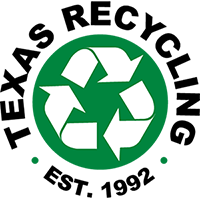Most purchasers of consumer goods are familiar with seeing recycling symbols on packaging. Plastics, cans, glass, paper, and cardboard boxes can all have recycling symbols displayed. These symbols have two purposes: 1) to direct consumers to recycle the item after use, and 2) to indicate if the packaging is manufactured with recycled materials. However, there is not a completely standardized recycling symbol system. At Texas Recycling in Dallas, Texas, we’re here not only to help our commercial and industrial recycling customers improve their bottom line by recycling corporately and efficiently but also provide education to support recycling efforts community wide.
The Recycling Symbol Name
Did you know that the familiar recycling symbol of three arrows in a triangle has a name? It’s not just called the universal recycling symbol—it’s also called the Mobius Loop. Designed by Gary Anderson, the recognizable symbol was the winning entry for an art contest. The three sides of the triangle represent “reduce, reuse, recycle”.

The Mobius Loop Symbol
Each arrow represents one of the stages of recycling: the collection and sorting of recyclables, processing into raw materials for manufacturing new products, and the sale of these new products created with recycled goods. The continuity of the three arrows in a loop represents how the recycling cycle can continue, and that each part of the cycle supports the other parts.
The Familiar Recycling Symbol Has Been Around for Over 50 Years
First, we will discuss how the symbol indicates what can be recycled. It is important to note that just because a product carries the Mobius Loop, it does not automatically guarantee that the item can be recycled in your municipality. For example, on plastics the recycling symbol will have a number inside the arrow triangle, 1 through 7. Consumers need to know which numbers indicate the item is acceptable for recycling, and which need to be tossed in the garbage.
It’s also worth noting that even among plastics with recyclable numbers, items must be clean and dry. Residue from food, oil, or other substances can contaminate a whole batch of recyclables, making them unusable. So, even if that takeout container has a #1 or #2 symbol, give it a rinse before tossing it into your bin.
Texas Recycling: A Dallas Recycling Facility for Metal, Cardboard, Paper Recycling and More! Call 214-357-0262
Recycling Symbols on Plastics
Recycling symbols on plastics may be hard to see as they are often embossed, and not printed, on the plastic item. Be sure to check with your local area to learn what numbers are accepted in your neighborhood. You can find some general information about plastic recycling symbols below:
- PET or PETE (polyethylene terephthalate) is the most common plastic and one of the most recyclable. Items include soft drink and other plastic beverage containers, food bottles like ketchup and salad dressing, etc. It is widely accepted in local curbside recycling programs.
- HDPE (high density polyethylene) is found in cleaning products bottles, juice bottles and milk bottles. It is also commonly used and accepted by most local curbside recycling programs.
- PVC (polyvinyl chloride) and V (vinyl) is tough and weathers well but is not easily recycled due to the possible release of toxins.
- LDPE (low density polyethylene) is used in bread bags, grocery bags and frozen foods. Often not accepted by curbside recycling programs, many grocery stores accept grocery bags for recycling. In the future, it is likely that more and more communities will begin to accept #4 plastics for their recycling efforts.
- PP (polypropylene) is often used as containers that will hold hot liquids. Check with your local recycling program to see if #5 can be added to the recycling collection.
- PS (polystyrene) is what we commonly call Styrofoam. Its molecules contain a possible carcinogen, so most environmentalists encourage reducing the use of polystyrene. It is also not accepted by most community recycling programs.
- Other plastics, such as polycarbonate, fall in the #7 category. They are generally not collected by neighborhood curbside recycling programs.

Photo credit: The Association of Plastic Recyclers
A growing number of eco-conscious companies now print clearer recycling directions directly on the label, telling consumers exactly how to recycle the item. This includes notes like “Remove label before recycling” or “Recycle cap separately,” which makes the process easier for all.
Texas Recycling: Our Dallas Recycling Center Helps Your Business with Revenue by Accepting Recyclable Items. Call 214-357-0262
Recycling Symbols on Cardboard and Glass
Recycling symbols can also be found on cardboard and other packaging. Often in black, it may or may not have a “please recycle” message along with the symbol. Clean, dry cardboard packaging is acceptable by nearly all municipal recycling programs. Glass, too, is widely recyclable. Some bottles will have the recycling symbol, while other manufacturers do not label their goods. As with plastic recycling, check with your local provider for specific instructions on how to recycle cardboard and glass.
It’s important to note that some cardboard packaging is lined with a plastic coating—often found in frozen food boxes—which may make it unrecyclable in some areas. Again, checking with your local recycling guidelines can make a big difference.
Our next blog will be Part 2 of deciphering recycling symbols. We’ll discuss how the symbol can show recycled content in a product, and how one organization is working to standardize and simplify its use.
Texas Recycling Offers Commercial Recycling Solutions in Dallas
Texas Recycling is committed to educating the public about recycling and the environment. We offer customized recycling programs for companies and industries, allowing businesses to earn revenue and help the environment. Plus, individuals, organizations and smaller businesses can bring recyclables to our Public Buy Back Center.
Businesses that want to help both the environment and their bottom-line partner with Texas Recycling for commercial and industrial recycling. With over 30 years of industry experience, our customer service is second to none. Call 214-357-0262 to get started on a commercial recycling or industrial recycling program for your organization.

